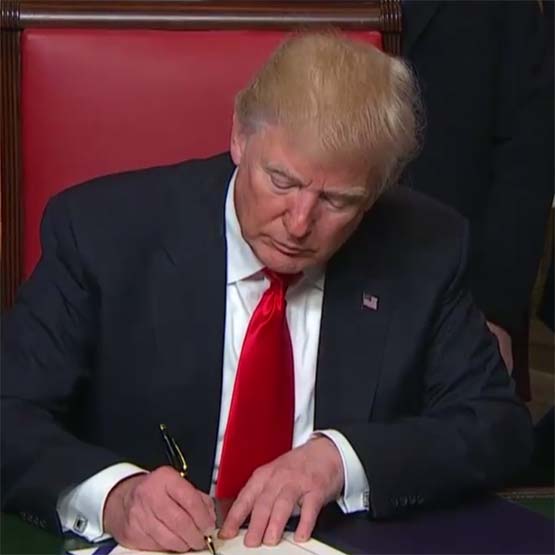
It is a mistake to measure presidential power by simply counting the number of executive orders issued, as many have done. On that score, Trump trailed his predecessor, issuing only four executive orders in his first week, compared with Obama's five. The important question is one of quality, not quantity: what kind of issues did the president tackle via executive action?
Donald Trump's executive orders were not addressed to the usual housekeeping functions of a new president.
Instead his four executive orders began to undo the signature legislative accomplishment of Obama's two terms, Obamacare, while also ordering plans for a multi-billion dollar wall on the border with Mexico, defunding sanctuary cities, and expediting environmental reviews and approvals.
Huge issues: health care, immigration, the environment, transformed with the stroke of his Century II Cross pen.
But the new president didn't stop there. He also issued eight presidential memoranda in his first week.
What is the difference between executive orders and presidential memoranda? It's a subtle one, with memoranda being less formal, not required to be publicly released, not published in the Federal Register, more easily overturned.
But still, using this tool, he took down even more of the Obama legacy: withdrawing America from the TPP trade agreement, restricting funding for international organizations that provide abortion services, restarting two major pipeline projects, streamlining regulations on manufacturing and so forth.
Again major rollbacks of major Obama policies with the stroke of a pen.
Those whose legacy is built on executive orders may die by executive orders. Meanwhile, no one doubts that Congress will in fact repeal and replace the signature accomplishment of the Obama administration: Obamacare.
A major transformation of health care, and a huge expansion of the welfare state, Obamacare is arguably the most important piece of domestic legislation passed in 50 years. So how could it be undone so easily?
Again the seeds of its undoing were planted in the process by which it was enacted.
When you pass a revolutionary reform such as Obamacare quickly, on a strict party line vote, it sits too lightly in the water, it has no ballast of support to make it through the changing tides and storms of politics.
It was passed by Democratic votes entirely, and it can now be undone by Republican votes alone.
The underlying problem is that policy is now made in Washington not by deliberation and compromise but by using the metaphors and strategies of war and action. We do not seek broad-based support for new ideas, but rather a coalition of the willing who will vote to put something into action, or later vote to eliminate it.
No less a policy expert than a Fram oil filter installer said on a car repair commercial years ago: "You can pay me now or pay me later."
In other words, you can do preventive maintenance up front, which will be cheaper and last longer, or you can wait until things break down and pay a higher price. That's where we are on policy.
By not taking the time up front to develop broader coalitions in favor of some kind of incremental step on something like healthcare or immigration, instead we bet the farm on more grandiose ideas, implemented with the weak tools of executive orders and party-line votes in Congress.
The seeds of the Trump revolution were planted in the Obama years, not only by going too far left, but by enacting changes with limited support and weak tools. But so far Trump is traveling the same path.
The road back to deliberation and compromise will be long, hard and difficult, but it's the only way to ensure long-term changes.

 Contact The Editor
Contact The Editor
 Articles By This Author
Articles By This Author